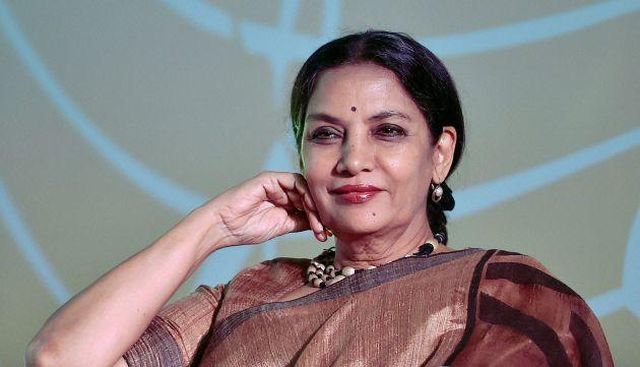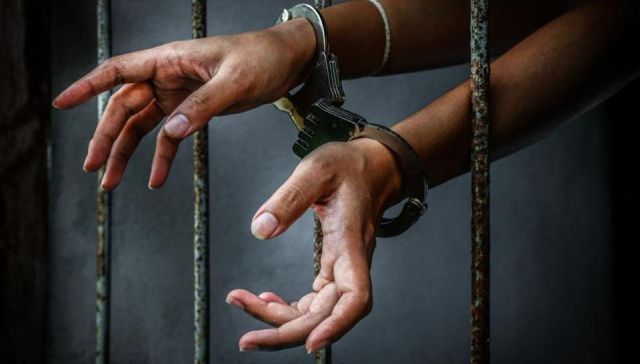
by Editor | May 25, 2021 | Entrepreneurship, News, Social Entrepreneur, Success Stories, Women Entrepreneur

Shabana Azmi
New Delhi : Veteran actress and philanthropist Shabana Azmi, an active spokesperson for women empowerment, believes having women as leaders can bring about a change.
“Women leaders can change the world. When women have a seat at the table, they lend their unique perspective to policy decisions that impact them and their communities,” Shabana said in a statement.
She appreciated ‘Asmita-Woman’, a programme to be hosted by the Foundation for Management Research and Training (FMRT) here on September 30 to recognise the power of women and also to bring together some women who have made the change happen in society just by thinking different and being independent.
Shabana said that providing a platform to the women who have done something different for society is a much-needed step that has been taken by FMRT.
“Creativity becomes capacity when it brings light into the life of others,” said Jyoti Rana, Chairperson, FMRT.
Celebrated classical dancer Shovana Narayan will also be a part of the event.
Neharika Vohra, recipient of the Woman Achievers Award, said: “Women leaders should not be a topic for discussion in 21st century. However, given the shortage of women leaders across almost all sectors we need to figure out to have more of such leaders. Society, family, workplaces, all need to relook how they can support women to perform their best.”
Former beauty queen Shivani Wazir Pasrich, hockey star Mamta Kharab and motivational speaker Rashmi Bansal will be some of the speakers among others.
—IANS

by Editor | May 25, 2021 | Books
 By Saket Suman,
By Saket Suman,
Book: The Wind In My Hair; Author: Masih Alinejad; Publisher: Little Brown UK/Hachette India; Price: Rs 699; Pages: 394
A courageous woman, driven by nothing but her insistence on living life the way she wanted to, untied her hair and let the beautiful curls flow over her shoulder. And all hell broke loose — she had defied the local law that stated women must wear a veil or hijab over their hair while in public.
Iranian journalist and activist Masih Alinejad’s incredible story of fighting for what she believed in and how she founded a major movement for women around the world with the simple removal of her hijab, is captured in her aptly titled memoir, “The Wind In My Hair”, out this month in India.
She recalls that as a young girl she travelled from her small village of Ghomikola to the city of Babol to attend high school. Here she saw that most young women did not wear the “chador”, a large cloak that leaves only a woman’s face visible, and thus decided to stop wearing one herself.
But her father became furious. “You make the devil blush with your sinning. You have brought shame on me, brought shame on your mother. You have ruined our reputation,” he said, scolding her. Ironically, when she was being scolded she was clad in a hijab.
Many years later, when Alinejad was a reporter covering the Iranian parliament and was accompanying a commission on a pilgrimage to Mecca, she along with two other female reporters decided not to wear the chador as it was very hot. But she was dressed in a hijab, a dress, trousers, and a long jacket.
“You are shameless — you have no morality. You have brought shame on the Iranian delegation,” a male reporter shouted at her.
Alinejad was very young when the 1979 Islamic Revolution swept across the country. What followed was a diktat that required all women in Iran, including visitors from other countries, to wear the hijab.
“I was taught that women’s bodies encouraged men to commit sin,” Alinejad writes. She also points out that female members of her family even slept wearing the hijab.
In her teens, she was sent behind bars and was subjected to what she calls “intense interrogation” as she had sided with a political group critical of the Iranian government. But the series of unfortunate events had just begun as, several years later, her husband would leave Alinejad for another woman. However, the courts granted him full custody of their three-year-old son.
All of these events, one after the other, sparked anger and outrage and gradually shaped Alinejad into somebody who defied rules and called for freedom. She went on to write scathing articles that exposed corruption and targeted the supporters of the then Iranian President Mahmoud Ahmadinejad. She was forced to leave the country.
First in London and currently in New York, she lives in exile and has little hope of returning to her native Iran. But after her ouster from the country, she has been actively campaigning against the compulsory hijab law and policing of women’s bodies back home.
The turning point came in 2014 when she posted a photograph of herself in London — without a hijab — on Facebook. This was followed by another similar picture, but this one was taken while she was still in Iran. Both the pictures communicated strong messages as her hair was blowing freely in the wind.
She then called on the women from Iran to post similar pictures of themselves without the hijab in public places and this became a movement of sorts. Across Iran, women started posting pictures of their uncovered hair on Alinejad’s page in open defiance of the strict religious beliefs of their country (and often, their families) while also sharing their personal stories about this powerful mode of expression.
She titled her campaign as “My Stealthy Freedom” and states in the memoir that it celebrates “the moments of small rebellion, the tiny acts of defiance that allow us to breathe, the guilty pleasure of breaking unjust rules”. The page now has more than a million followers on Facebook.
She points out that she is not against the hijab but against compulsion, insisting that women in Iran should be allowed to choose what they wear and how they wear it.
In its totality, the memoir tells a compelling story with courage. But the almost-400-page book is often repetitive and could have become a more pleasurable read with some editing.
(Saket Suman can be contacted at saket.s@ians.in)
—IANS

by Editor | May 25, 2021 | Business, Markets, Networking, Online Marketing, SMEs, Social Media, Technology
 By Nishant Arora,
By Nishant Arora,
New Delhi : GoDaddy, the world’s largest Cloud platform dedicated to small and independent ventures, is empowering small and medium businesses (SMBs) in tier 2 and 3 cities of India and, to its surprise, is finding young women more keen to learn the skills needed to go online.
The US-based Internet domain registrar and web-hosting company is equipping web professionals and local resellers with the right tools, knowledge and skills they need to help grow their ventures online.
“As we go deeper into the country, we see huge numbers of young web developers and entrepreneurs waiting to be trained, in order to help local companies grow online in the New-Age technological environment,” Nikhil Arora, Managing Director and Vice President, GoDaddy India, told IANS in a free-wheeling chat.
“To our surprise, we find women more forthcoming and eager in tier 2 and 3 cities to learn new digital skills. We are also excited to see the positive response among web professionals and SMBs alike,” Arora noted.
Women entrepreneurs continue to face several challenges like gender bias and access to financial funding or venture capital in the country. According to a recent Mastercard Index of Women Entrepreneurs (MIWE) report, India is ranked 52 in the list of 57 countries surveyed when it comes to empowering women to run successful businesses.
Even the technology hub Bengaluru and capital New Delhi ranked 40th and 49th, respectively, on a list of 50 women entrepreneur-friendly global cities, said another report by US tech giant Dell Technologies last month.
The growing enthusiam among young women to learn digital knowledge and skills is a welcome sign, said Arora.
Today, one million people in India rely on GoDaddy’s products to get their ideas online and Arora wants to quickly add the next million in GoDaddy’s bucket.
Formed as Jomax Technologies in 1997, the company launched its first website building software and hosting services in 1999. In 2000, the name GoDaddy came into existence.
Today, with more than 17 million customers worldwide, GoDaddy has over 75 million domain names under management.
For the second quarter that ended on June 30, GoDaddy reported revenues of $651.6 million — up 16.8 per cent year-on-year — and international revenue s were at $233.3 million, up 24.3 per cent (year-on-year).
“We are very bullish on India. We have seen 8-10 million Indian SMBs — out of more than 25 million — taking their businesses online and next on our radar are the rest which are eager to go digital but don’t have the right tools, guidance and skill-sets,” Arora emphasised.
According to him, in a growing market like India, web developers are interested in learning new processes with new tools to help manage their clients while, at the same time, ensuring quality and expanding their business.
GoDaddy has already trained over 700 web professionals in Pune, Jaipur, Kochi and Ahmedabad.
“Web developers are a driving force in helping SMBs increasingly do business online and helping to shape the growth of the digital economy,” Arora told IANS.
As part of GoDaddy’s initiative, web professionals receive extensive education on how to amplify their business, develop and upgrade skills while accessing GoDaddy resources to help create and manage an effective digital presence for small business clients.
In its recent “Global Web Developer’s Survey”, GoDaddy found that nearly 50 per cent of developers in emerging markets like India tend to have more new businesses when compared to developers in other regions.
The findings showed that the primary drivers of small business websites are: Selling new services to existing clients (40 per cent); providing support to existing clients (31 per cent); and finding new clients and reselling products/services (28 per cent).
The research also found that in the US, developers and designers are more likely to work for a small firm and concentrate their work on fewer clients who provide larger retainers. However, in India, web developers primarily work in formal office environments.
According to Arora, web developers in India are now regularly guiding and engaging with small businesses to help them get online — given the “Do-It-For-Me” nature of the customers.
The pervasiveness of smart devices and increasing affordability has further encouraged millions of small businesses to leverage mobile to enhance their business. Over two-thirds of web pages designed by web developers for small businesses in India are more likely to be tailored and targeted for mobile.
According to Arora, the next wave of small businesses will rely heavily on web designers and developers.
“Supporting our customers in India, with increased training and support, and being available to help them create and grow their online presence for their business, has always been a key element of our value proposition,” said Arora.
(Nishant Arora can be contacted at nishant.a@ians.in)
—IANS

by Editor | May 25, 2021 | News

Representational image
Jaipur : Three women were arrested in Rajasthan’s Alwar with 40 kg beef on Monday, police said.
Govindgarh police station’s Sub Inspector Dhara Singh told IANS that police received a tip that beef was being packed in polythene bags in the house of Khaleel to be sold, and raided the location where they found cow fur and the large quantity of beef.
Akbari, wife of Khaleel, Bhoori, wife of Shakeel and Sajeena, wife of Sameem, all found on the spot, were arrested.
On questioning, Akbari confessed that her son Shakeel and his friend Sattar had brought beef to her house after slaughtering a cow to sell it further, he said
The samples of the meat were sent for testing which confirmed it to be beef, said Dhara Singh.
Shakeel and Sattar are absconding and a manhunt has been initiated to nab them at the earliest, he said.
“Once they are arrested, we will get clues if they are regular suppliers of beef to shops or if they are supplying it to any particular house in this region,” he added.
Meanwhile, a peaceful bandh was staged on the call of Hindu associations including Vishwa Hindu Parishad and Bajrang Dal, he said, adding that shops were closed since morning.
Rakbar Khan was lynched to death in this area on intervening night of July 21-22 on charges of cow smuggling.
—IANS

by Editor | May 25, 2021 | Entrepreneurship, News, Women Entrepreneur
 By Bhavana Akella,
By Bhavana Akella,
Bengaluru : Malvika Iyer was a charming 13-year-old girl in 2002 when a grenade accidentally blew up in her hands, ripping her forearm and paralysing her legs, in Bikaner, Rajasthan, where she lived with her parents. An accident that could have ended her life completely changed her perspective, and even though it took years for her to overcome the trauma, she came out stronger and not only found a way to get her life back on track, but also became a harbinger of change for the disabled.
It was a change in the attitude of others, which came along with the trauma, that sensitised her towards the stigma associated with disability and she chose not to take it lying down, but fight against it not only for herself but for many others like her.
Now 29, the Chennai-based activist has overcome her disability by sheer will and was honoured with the prestigious Nari Shakti Puraskar (Women Power Award) by President Ram Nath Kovind in March this year for pushing the envelope in making everyone understand disability and come to terms with the physically challenged.
Through her talks across countries like the United States, Norway and South Africa as a global motivational speaker, Malvika’s saga has been igniting hope for thousands of people with disabilities the world over.
“I grew up at Bikaner in Rajasthan, where my father was working as an engineer in the state Water Works Department. The incident occurred on May 26, 2002 when I was 13 years old and studying in class IX.
“As I was rummaging in the garage at home, I unknowingly held a grenade in hand that blew up, snapping my forearms and severely injuring my legs, which lay dangling,” recalled Malvika in an interview to IANS.
A fire that broke out in the ordnance depot at Bikaner in January 2002 had flung pieces of ammunition in the vicinity, one of which claimed her arms.
Though bed-ridden for nearly 18 months after multiple surgeries on the legs, which suffered nerve paralysis, and the arms that were fitted with prosthetics, a restless Malvika soon pushed herself to face the challenge of her life at such a young age.
With just four months left for class X exams in 2004, she decided to appear as a private candidate in Chennai for the Tamil Nadu Secondary School Leaving Certificate (SSLC), having missed class IX in 2002-03 after being hospitalised.
The gritty survivor, a bilateral amputee, then took her first steps with her parents’ support and wrote the exams with the help of a scribe as she was still getting used to prosthetics. Her determination had the nation in awe as she passed the board exam with distinction and was among the toppers in the southern state.
“Then President A.P.J. Abdul Kalam read about me in a newspaper and had invited me to Rashtrapati Bhavan. He (Kalam) had asked me about my career plans and spoke to me about missile making,” Malvika fondly recalled.
“Facing board exams with no arms and meeting a President like Kalam made me realise that I should never feel bad about anything lost. There was no looking back after this thought,” asserted the disability rights activist.
Since then, Malvika forged ahead with higher education at the prestigious St. Stephen’s College in Delhi in Economics, a Master’s in Social Work from the Delhi School of Social Work and an M.Phil and Ph.D. in Social Work from the Madras School of Social Work in Chennai, even as she learnt to tackle disability and people’s attitudes towards it head-on.
“I was very active throughout my childhood — good at sports, dancing and had a fun teen life. It wasn’t easy to cope with losing my arms and seeing my legs weakened. But I soon felt that people’s attitude to disabilities hurt more than disability itself,” Malvika quipped.
In 2013, she delivered her first public speech in Chennai, opening up on how the incident changed her life forever. Soon she appealed to many nations across the world, demanding better laws and facilities for the disabled.
Through her talks, Malvika has been highlighting the issues of inclusion, attitudinal change towards the disabled, accessible elections, accessible fashion — where clothing is designed keeping disabilities in mind — body positivity, celebrating people with all body types, etc., while allowing people to connect with her through her own story.
“Every day, I receive hundreds of messages from people across countries, saying that I’ve been a reason why they never gave up in life. It is overwhelming that I’m able to make a difference in people’s lives,” noted Malvika, who also turned a model to advocate accessible fashion.
She is a member of the Chennai hub of Global Shapers Community, an initiative of the World Economic Forum to encourage young people below 30 to work for change, and the United Nations Inter-Agency Network on Youth Development, allowing her to carry her voice across continents.
In March 2017, the United Nations invited her to deliver a speech at its headquarters in New York.
“I was humbled to receive a standing ovation from international delegates when I shared my story,” the gender and disability rights advocate added.
Prime Minister Narendra Modi, who interacted with the Nari Shakti Puraskar awardees in March, described her as an “adbhut naari” (wonder woman), Malvika recollected, stating the award makes her want to work more for women and disabled.
“It is unfortunate that accessibility remains a major issue in our country. There is a need for an attitudinal shift among the people, as discrimination is the main obstacle fro the disabled, making them feel excluded from society,” she pointed out.
Through her Ph.D. research on reasons for stigmatisation of people with disabilities, Malvika urged for a school curriculum that sensitises children from a young age on disabilities.
“I hope I can work with the state-run bodies and educational institutions to introduce a curriculum in schools for the youngsters to understand disability and eliminate pity and stigma,” Malvika said.
(The weekly feature series is part of a positive-journalism project of IANS and the Frank Islam Foundation. Bhavana Akella can be contacted at bhavana.a@ians.in )
—IANS





